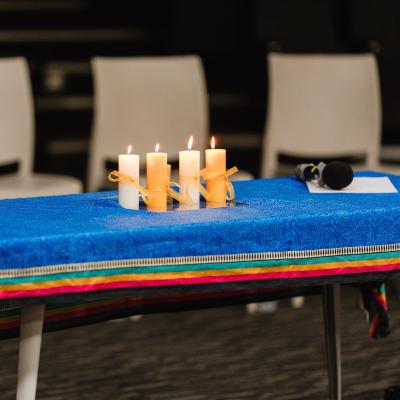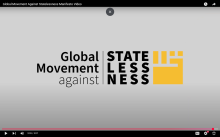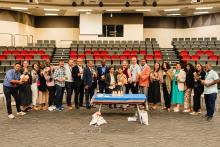“Together, we are reshaping narratives, challenging injustice, and proving that our worth is not defined by borders or the documents that seek to erase us.”
Christy Chitengu, the Global Movement Against Statelessness Co-Lead
KEY FACTS ABOUT THE GLOBAL MOVEMENT AGAINST STATELESSNESS
- The Global Movement Against Statelessness (GMAS) was formally launched in 2024, to bring the statelessness field closer together, challenge power dynamics, centre stateless people, strengthen collaboration and achieve positive change.
- GMAS is a community of stateless people, activists and civil society allies dedicated to ending statelessness, securing the equal nationality rights of all people and upholding the human rights of stateless individuals.
- GMAS challenges historical power dynamics by placing people directly impacted by statelessness, nationality deprivation and discriminatory nationality laws at the centre of its leadership, while working to strengthen solidarity across the field.
WHAT IS THE GLOBAL MOVEMENT AGAINST STATELESSNESS?
The Global Movement against Statelessness (GMAS) is a community of stateless people, activists, and civil society allies - including NGOs, academics, and artists - “dedicated to the eradication of statelessness, the achievement of equal nationality rights, and the realisation of human rights of all stateless people.” Launched in February 2024, GMAS aims to build trust and solidarity among its members by creating a common space for individuals and organisations working on this issue worldwide and, in doing so, bring the field closer together. By improving coordination, strengthening alliances, and engaging diverse social justice actors, from grassroots to international levels, GMAS seeks to foster more effective and unified advocacy efforts.
With over 400 members, around a quarter of whom are directly affected, GMAS seeks to challenge and re-shape top-down power structures in the statelessness field by placing those directly affected by statelessness, nationality deprivation and discriminatory nationality laws at the centre of the Movement. The decision-making and agenda-setting power for GMAS rests in the hands of stateless-affected communities, who are empowered to lead and define the direction of the Movement.
The commitment to equitable governance, transparency, collective self-reflection and accountability is reflected in the Movement’s structure. The Movement’s structure is built to make its values real in everyday practice. Equitable governance comes through leadership by people with lived experience of statelessness, alongside working groups that give space for members with different backgrounds and expertise to shape decisions. Transparency is supported not only through open consultations and clear policies, but also by making budget decisions collectively and visible to Interim Core Group members, with an emphasis on financial independence so the Movement can set its own priorities without being donor-driven. Accountability runs through every layer, from clear roles for the Secretariat to systems that ensure leadership stays answerable to the membership. In this way, the Movement’s structure is not just organisational, it’s a living reflection of how GMAS wants to work together. GMAS uses a co-leadership model, recognising that the diverse situations of stateless communities globally requires lived experience leadership drawn from different contexts and geographies, as well as equitable gender representation. GMAS has organised its activities into two clusters to align with the Movement’s objectives; the Membership Facing Cluster works on community engagement, risk and safety, and membership, while the External Partner Facing Cluster works on advocacy, partnerships, resource development, and other specific projects. In addition, a Cross Cutting Support team delivers financial administration, communications, and fundraising services to support to both clusters. The Movement is fiscally hosted by Open Collective Europe and is incubated by the Institute on Statelessness and Inclusion which provides additional strategic support and mentorship as well as providing two of the three Secretariat members who administrively and strategically coordinate the ICG and the Movement membership.
BACKGROUND TO THE GLOBAL MOVEMENT
The idea for the establishment of a Global Movement first emerged out of the 2019 World Statelessness Conference in the Hague. Structural exclusion and power imbalances work in tandem to drive and perpetuate unequal nationality rights, exacerbate the consequences of statelessness, and also shape and limit the statelessness field, hampering its ability to meaningfully address statelessness. The Global Movement originated as an idea intended to provide a structure through which to facilitate stronger collaboration between established NGOs, activists and persons affected by statelessness - enabling civil society to more collectively and effectively fulfil its objectives and engage with key stakeholders. Designed and led by those in the stateless community, such a Movement could challenge and re-shape the power structures and roles played by different actors in the statelessness field.
After the 2019 Conference it was clear that the statelessness field was ready for a global movement and so throughout 2020, ISI facilitated an extensive consultation process with NGOs and activists to understand how a co-ordinated, global movement could relate to or help amplify their work, reaching consensus on what was needed while providing space to air concerns or apprehensions. A 23-member Interim Core Group (ICG) was established in November 2020 as a short-term structure tasked with driving the Movement forward. Half of the founding members of ICG had lived experience of statelessness – an essential component of GMAS’s mission and a defining element of its identity. In coordination with the broader stateless community, the ICG developed a Manifesto and produced an Options Paper outlining potential future structures and operational models. This work was informed by surveys, mapping exercises, research into other global social movements and consultations with the broader statelessness community. The ICG has since moved through several iterations with the current structure comprising two co-leads; 13 ICG members (inclusive of the two co-leads); eight Advisory Group members and three Secretariat members. Over half of the ICG and exactly half of the AG have lived experience of statelessness. GMAS was formally launched in February 2024 at the second World Conference on Statelessness in Kuala Lumpur.
KEY OBJECTIVES AND HIGHLIGHTS FROM THE GLOBAL MOVEMENT
As part of its Membership Objectives, GMAS aims is to expand and increase the diversity of its members, addressing barriers such as language to improve global representation, and facilitate a global platform to connect stakeholders and foster greater information exchange, capacity development and learning opportunities. GMAS has also formally partnered with the Global Statelessness Fund in the delivery of the Fund’ss Accompaniment Programme.
GMAS convenes regular Community Calls (the first held in March and July 2025), which bring together stateless individuals, advocates, and allies in a safe and inclusive space to spotlight the human rights impact of statelessness. The agendas featured a range of formats, including community-led storytelling, personal narratives, artistic expression, policy dialogue, and legal perspectives. Designed to amplify the voices of those directly impacted and reflect the diverse dimensions of statelessness, the events reinforced a shared sense of connection, recognition, and collective purpose across borders and generations while also deepening awareness and engagement across the wider statelessness ecosystem.
As part of its External Partner Facing Objectives, GMAS advocates for and facilitates the representation of people affected by statelessness and discriminatory nationality laws in relevant global convenings. This work includes seeking cooperation with other stakeholders to advance GMAS’ mission, as well as raising awareness of the issue globally to shift public opinion. GMAS also supports national and thematic efforts to address statelessness through global engagements and by offering a global perspective. For example, in May 2025, GMAS issued a high-impact joint statement – internationally endorsed by over 70 individuals and organisations from Africa, Asia, Europe, the Americas, and the Middle East – condemning India’s maritime expulsion of Rohingya refugees to Myanmar and land border pushbacks into Bangladesh. The statement reaffirmed the principle of non-refoulement and aligned with key international human rights frameworks.
HOW TO GET INVOLVED IN THE GLOBAL MOVEMENT AGAINST STATELESSNESS
Individuals or organisations interested in joining the Global Movement, can sign up for the GMAS mailing list here or get in contact at [email protected]
Those interested in learning more about the Global Movement can consult key publications such as the GMAS Options Paper and Manifesto as well as follow news updates on the GMAS website.
Media and journalists are encouraged to reach out directly at [email protected]
The text on this page was reviewed by Christy Chitengu and Ali Johar, Co-Leads of the Global Movement Against Statelessness.
[Last updated: September 2025 ]
VOICES & EXPERIENCES
-
The Global Movement Against Statelessness
![GMAS]()
The Global Movement Against Statelessness
![GMAS]()
"The Global Movement Against Statelessness (GMAS) is groundbreaking in its commitment to centring the fight against statelessness around those who have lived it. GMAS's work makes me feel seen and valued, showing that stateless people are not just topics for discussion but essential voices in shaping the solutions. We are no longer on the sidelines but at the table, driving the change we need."
Christy Chitengu
Co-leader of the Global Movement Against Statelessness
"The Global Movement Against Statelessness (GMAS) is a bold initiative that truly centres lived experiences like mine to lead and in decision-making. I am not a tokenistic participant here, but I have genuine respect and the opportunity to contribute. Our goal is to create a dynamic that empowers stateless individuals, deepens our understanding of shared humanity, and drives action to ensure nationality rights for all. I am honoured to Co-lead the Movment's Interim Core Group (ICG) and feel a deep sense of belonging.”
Ali Johar
Co-leader of the Global Movement Against Statelessness
The Global Movement Against Statelessness was officially launched on 27 February 2024 during the World Conference on Statelessness. It is a community of stateless people, activists and civil society allies dedicated to the eradication of statelessness and the achievement of equal nationality rights for all and the human rights of all stateless people. The Movement centres and is led by people directly impacted by statelessness, nationality deprivation and discriminatory nationality laws and works to increase solidarity in the field. It aims to bring the statelessness field closer together to strengthen collaboration and achieve positive change. You can now find the Movement on all social media platforms @NOstatelessness, visit their website for more information and sign up to the mailing list.
-
Global Movement Against Statelessness Manifesto Video
![Global movement Against Statelessness]()
-
Reflections from the Global Movement Against Statelessness Community Call
![Global movement Against Statelessness]()
Reflections from the Global Movement Against Statelessness Community Call
![Global movement Against Statelessness]()
“As a Communications Lead, I understand the power of storytelling, not just through facts and data, but through the lived experiences of individuals and communities. Statelessness, though often sidelined, becomes palpable when expressed through art, testimony, and candid dialogue. This Community Call ensured that every voice, particularly those from stateless communities, found a space to be heard.”
Sam March
Communications Lead at the Global Movement Against Statelessness
The March 2025 GMAS Community Call served as a dedicated forum to bring together stateless individuals, advocates, artists and experts for an inclusive exchange. The meeting combined policy dialogue with creative expression, including poetry, visual art and personal testimonies, to highlight the multifaceted realities of statelessness. It provided a structured space for reflection, knowledge-sharing and solidarity, emphasising both the systemic roots of statelessness and the resilience of affected communities. Watch the Community call recording here: https://youtu.be/hGwGHYW9Qzo?si=erFYue255aVVYMN-
Voice from: https://www.againststatelessness.com/news-reflection/blog-post-title-one-lxak7-nbmk9
Latest Resources
-
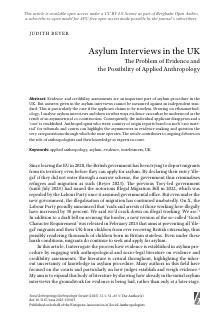
-
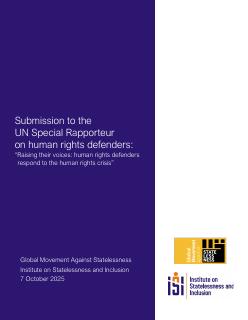
Submission to the UN Special Rapporteur on human rights defenders: “Raising their voices: human rights defenders respond to the human rights crisis”
Type of Resource: Report
Theme: General / Other
Region: Global / Other
View -
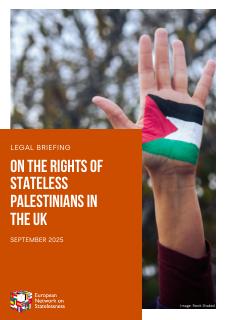
Legal Briefing on the rights of stateless Palestinians in the UK
Type of Resource: Briefing / Policy paper
Theme: Human Rights Enjoyment by Stateless People
Region: Europe
View
